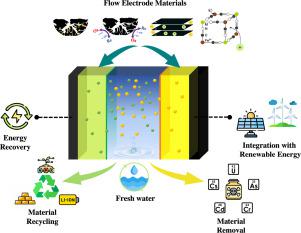Desalination ( IF 9.9 ) Pub Date : 2022-08-13 , DOI: 10.1016/j.desal.2022.116037 Nguyen Anh Thu Tran , Tran Minh Khoi , Ngo Minh Phuoc , Hye Bin Jung , Younghuyn Cho

|
Flow-electrode capacitive deionization (FCDI) is an emerging desalination technology that overcomes the drawbacks of traditional capacitive deionization (CDI) by providing larger salt removal capacity and continuous desalination operation. Various approaches to the choice of cell configurations and electrode materials allow FCDI to increase the salt removal performance and extend its potential applications. In particular, Faradaic electrode materials for FCDI have recently emerged due to their various advantages over capacitive material, which include higher salt removal rate, lower energy consumption, and the ability to selectively remove specific ions. In this review, we summarize the background technology and mechanism of the FCDI system with an emphasis on the development of electrode materials, including capacitive and redox active electrodes, as well as their role in the various applications for FCDI and its future direction.
中文翻译:

电极材料的最新进展及其在流动电极脱盐系统中的应用
流动电极电容去离子 (FCDI) 是一种新兴的脱盐技术,通过提供更大的除盐能力和连续脱盐操作,克服了传统电容去离子 (CDI) 的缺点。选择电池配置和电极材料的各种方法使 FCDI 能够提高除盐性能并扩展其潜在应用。特别是最近出现了用于 FCDI 的法拉第电极材料,因为它们具有优于电容材料的各种优势,包括更高的盐去除率、更低的能耗以及选择性去除特定离子的能力。在这篇综述中,我们总结了 FCDI 系统的背景技术和机理,重点介绍了电极材料的开发,包括电容和氧化还原活性电极,


























 京公网安备 11010802027423号
京公网安备 11010802027423号